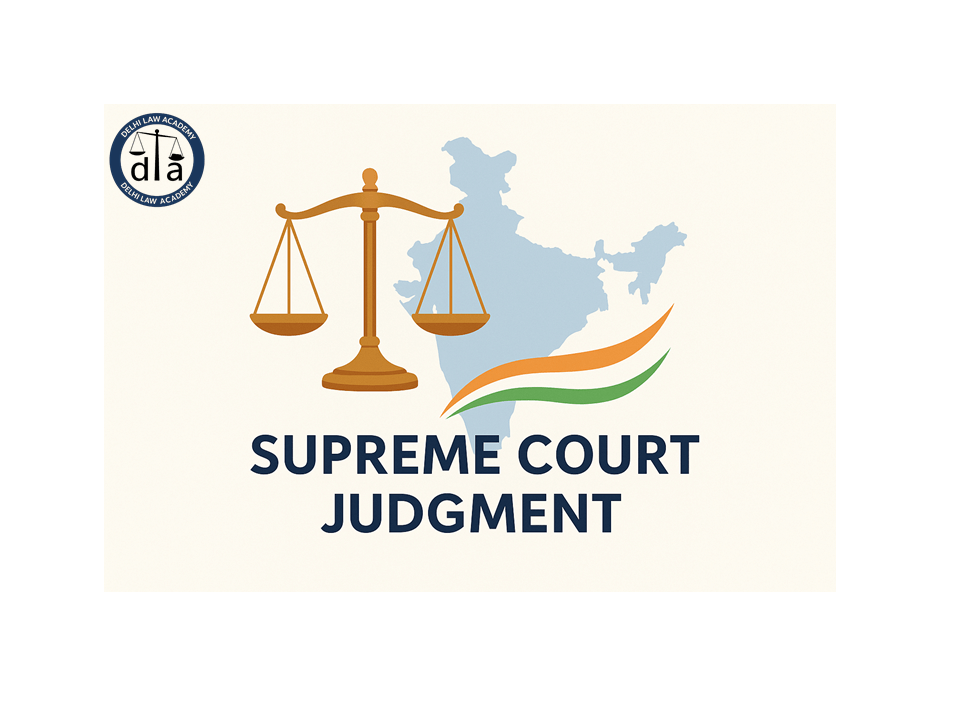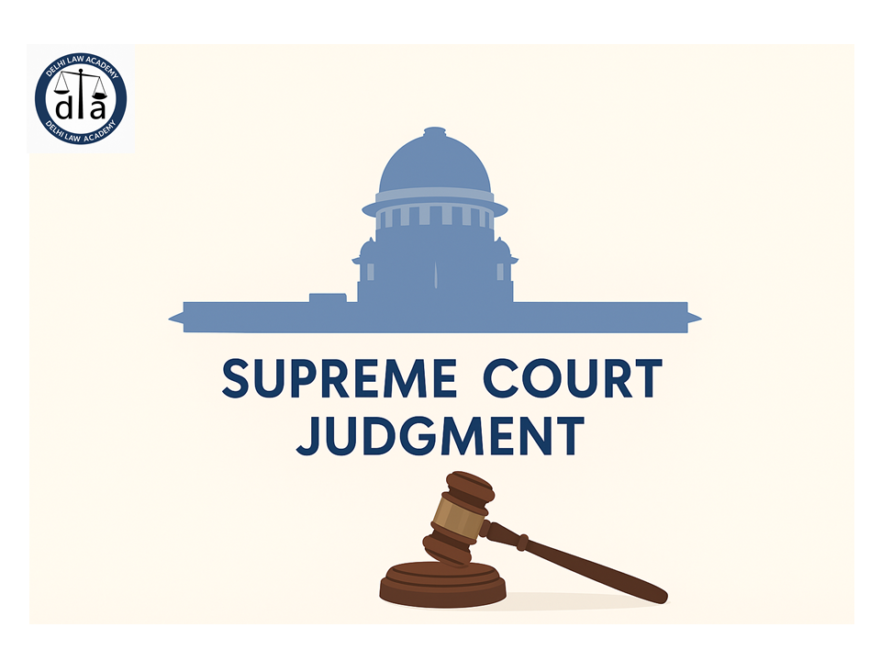
⚖️ Bail Application to be Decided within Two Months
Topic: Bail Application to be Decided within Two Months
📚 Delhi Law Academy Jaipur presents below for aspirants of
Rajasthan Judicial Service (RJS), DJS, PCS(J) and other Judicial Services throughout India
the most recent judgment of the Supreme Court of India, delivered on 12th September 2025,
asking all the High Courts to ensure that bail and anticipatory bail applications pending in any court
are disposed of expeditiously, preferably within a period of two months from the date of filing.
Presented below: Summarized version [by Delhi Law Academy Jaipur] of the Supreme Court Judgment in the case of
Anna Waman Bhalerao v. State Of Maharashtra delivered by a two-judge Bench comprising of
J.B. Pardiwala and R. Mahadevan JJ. on 12 September, 2025:
📝 Case Details
Anna Waman Bhalerao v. State Of Maharashtra [2025 INSC 1114]
Date: 12 September 2025
Court: Supreme Court of India
📖 Judgment
2. Both these criminal appeals arise from a common judgment dated 04.07.2025 passed by the High Court of Judicature at Bombay in Anticipatory Bail Application Nos. 1790 of 2019 and 1844 of 2019, whereby the appellants’ applications seeking pre-arrest bail in connection with F.I.R. No. 30/2019, came to be dismissed.
3. Based on a complaint lodged by one Vikas Narsingh Vartak, FIR No. 30/2019 was registered on 26.01.2019 …against Mahesh Yashwant Bhoir and others, for offences punishable under Sections 420, 463, 464, 465, 467, 468, 471 and 474 read with Section 34 of the Indian Penal Code.
3.2. On 13.05.1996, a Power of Attorney was purportedly executed in favour of Vijay Anant Patil (A2) by Narsingh Govind Vartak, and his brothers, and another Power of Attorney was executed in favour of Rajesh Kamat (A3) by the Shahs. On the strength of these Powers of Attorney, on 18.05.1996, a sale deed was executed by A2 and A3 in favour of Mahesh Yashwant Bhoir (A1) for a consideration of Rs.8 lakhs. Mutation Entry Nos. 15177 and 15180 were recorded in 1996 on the basis of this sale deed.
3.3. At the relevant point of time, the present appellants were serving as Circle Officer and Talathi respectively in the Revenue Department of the State of Maharashtra. Subsequently, a revision application was filed before the Sub Divisional Officer, Bhiwandi seeking cancellation of the said mutation entries, and by order dated 30.09.1998, Mutation Entry Nos. 15177 and 15180 were accordingly cancelled.
4. The appellants were not initially named in the FIR. They were later arraigned as Accused Nos. 5 and 6 on allegations that, in their official capacity, they had certified the said mutation entries on the basis of forged documents, thereby facilitating the illegal transfer of ownership of the immovable property. Apprehending arrest, they preferred Anticipatory Bail Application Nos. 561 and 562 of 2019 before the Court of the Additional Sessions Judge, Vasai. By order dated 06.06.2019, the Sessions Court granted interim protection to them. However, upon hearing both sides, the Sessions Court, by order dated 21.06.2019, rejected their applications.
Aggrieved, the appellants approached the High Court by filing Anticipatory Bail Application…, in which, interim protection was granted from time to time. Finally, by the impugned judgment dated 04.07.2025, the High Court rejected the anticipatory bail applications, but granted interim protection for a period of four week, which expired on 01.08.2025. Thereafter, the appellants have preferred the present appeals before this Court.
14. Although there has been a long delay in the initiation of proceedings, the gravity of the allegations, the alleged abuse of official position, and the prima facie findings of the High Court that custodial interrogation is necessary, cannot be diluted merely on the ground of delay. Even in a case based largely on documentary evidence, custodial interrogation may be essential to trace the chain of transactions, ascertain complicity, and prevent further suppression or tampering of records. Moreover, the appellants, despite enjoying interim protection for nearly six years, did not extend due cooperation to the investigation. In these circumstances, we see no reason to interfere with the judgement under challenge.
15. Apart from the relief of anticipatory bail, a significant issue that arises for consideration herein is the inordinate delay in the disposal of the appellants’ applications for anticipatory bail by the High Court. The record discloses that the applications remained pending for several years without any final adjudication, although interim protection was extended to the appellants from time to time, including even after the dismissal of the applications, until 01.08.2025.
It is true that the appellants themselves did not suffer prejudice, having continued to enjoy interim protection. Nevertheless, this Court has consistently underscored, in a long line of decisions, that applications affecting personal liberty – particularly bail and anticipatory bail – ought not to be kept pending indefinitely. The grant or refusal of bail, anticipatory or otherwise, is ordinarily a straightforward exercise, turning on the facts of each case. There is, therefore, no justification for deferring decision-making and allowing a sword of Damocles to hang over the applicant’s head. In matters concerning liberty, bail courts must be sensitive and ensure that constitutional ethos is upheld. While docket explosion remains a chronic challenge, cases involving personal liberty deserve precedence.
16. In this context, we may refer to the following decisions of this Court. In Nikesh Tarachand Shah v. Union of India, Justice R. F. Nariman while adverting to the Magna Carta in the context of pre-arrest bail, observed as under:
“15. The provision for bail goes back to Magna Carta itself. Clause 39, which was, at that time, written in Latin, is translated as follows:
“No free man shall be seized or imprisoned or stripped of his rights or possessions, or outlawed or exiled, or deprived of his standing in any other way, nor will we proceed with force against him, or send others to do so, except by the lawful judgment of his equals or by the law of the land.”
It is well known that Magna Carta, which was wrung out of King John by the Barons on 15-6-1215, was annulled by Pope Innocent III in August of that very year. King John died one year later, leaving the throne to his 9 year old son, Henry III. It is in the reign of this pious King and his son, Edward I, that Magna Carta was recognised by kingly authority. In fact, by the Statutes of Westminster of 1275, King Edward I repeated the injunction contained in Clause 39 of Magna Carta. However, when it came to the reign of the Stuarts, who believed that they were kings on earth as a matter of divine right, a struggle ensued between Parliament and King Charles I. This led to another great milestone in the history of England called the Petition of Right of 1628. Moved by the hostility to the Duke of Buckingham, the House of Commons denied King Charles I the means to conduct military operations abroad. The King was unwilling to give up his military ambition and resorted to the expedient of a forced loan to finance it. A number of those subject to the imposition declined to pay, and some were imprisoned; among them were those who became famous as “the Five Knights”.
Each of them sought a writ of habeas corpus to secure his release. One of the Knights, Sir Thomas Darnel, gave up the fight, but the other four fought on. The King’s Bench, headed by the Chief Justice, made an order sending the Knights back to prison. The Chief Justice’s order was, in fact, a provisional refusal of bail. Parliament being displeased with this, invoked Magna Carta and the Statutes of Westminster, and thus it came about that the Petition of Right was presented and adopted by the Lords and a reluctant King. Charles I reluctantly accepted this Petition of Right stating, “let right be done as is desired by the petition”. Among other things, the petition had prayed that no free man should be imprisoned or detained, except by authority of law.
18. We accordingly issue the following directions:
- 📌 High Courts shall ensure that applications for bail and anticipatory bail pending before them or before the subordinate courts under their jurisdiction are disposed of expeditiously, preferably within a period of two months from the date of filing, except in cases where delay is attributable to the parties themselves.
- 📌 High Courts shall issue necessary administrative directions to subordinate courts to prioritise matters involving personal liberty and to avoid indefinite adjournments.
- 📌 Investigating agencies are expected to conclude investigations in long pending cases with promptitude so that neither the complainant nor the accused suffers prejudice on account of undue delay.
- 📌 Being the highest constitutional fora in the States, High Courts must devise suitable mechanisms and procedures to avoid accumulation of pending bail / anticipatory bail applications and ensure that the liberty of citizens is not left in abeyance. In particular, bail and anticipatory bail applications shall not be kept pending for long durations without passing orders either way, as such pendency directly impinges upon the fundamental right to liberty.
18.1. The Registrar (Judicial) of this Court shall circulate a copy of this judgment to all High Courts for immediate compliance and prompt administrative action.
📚 Read our latest blog on Supreme Court Judgments
📰 Download Free Monthly Current Affairs for RJS Mains preparation
🎁 Access Free Study Material for Judiciary Exams
📌 FAQs on Supreme Court Judgment: Bail Applications to be Decided Within Two Months
📚 Further Reading for Law Aspirants
Explore more useful resources from Delhi Law Academy to strengthen your preparation:
Contact us
📍 Delhi Law Academy – Jaipur Branch
6C, Tower 2, Coaching Hub, Pratap Nagar, Jaipur – 302033
📞 Phone:
+91 9911916552
+91 8447285606
✉️ Email:
contactus@delhilawacademy.com

